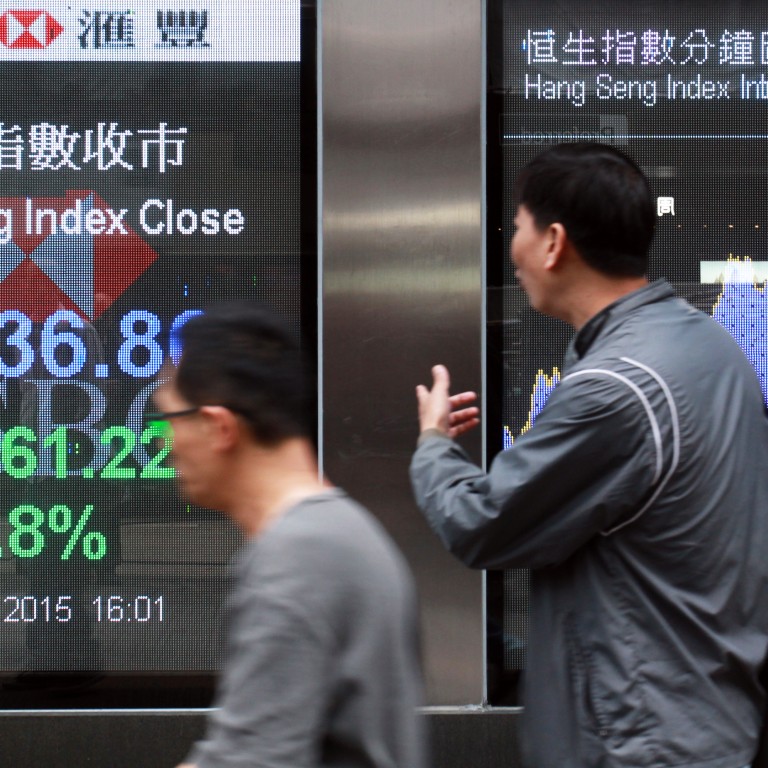
Global capital market trends must come with protection for investors
Brian Tang says responsible internet finance and market innovations will benefit Hong Kong's real economy
After the global financial crisis and industry-wide scandals, the loss of trust in our financial institutions has led to higher regulatory capital and compliance requirements that have limited lending at a time when many investors seek avenues to deploy their cash.
Around the world, two key themes driven by globalisation, technology and disruptive new business models have emerged to access new pools of "other people's money" to facilitate real economic growth, entrepreneurship and employment.
The first is the development of alternative sources of risk capital for small and medium-sized enterprises to create more jobs and encourage innovation. The World Bank predicts that crowdfunding investments in developing countries may reach up to US$96 billion a year by 2025.
Last month, the US Securities and Exchange Commission published its long-awaited Regulation A+ as part of the 2012 Jumpstart Our Business Startups Act that permits companies to more easily solicit sales of securities from retail and accredited investors, including through equity crowdfunding. Many other jurisdictions have issued new securities crowdfunding and peer-to-peer lending rules or public consultations, such as the United Kingdom, Canada, Australia and Singapore.
China's regulators are also reviewing this growing aspect of shadow banking, where online platforms such as Zhao Cai Bao (part of Alibaba's unlisted Ant Financial Services Group) reportedly created a 14 billion yuan (HK$17.7 billion) marketplace for SMEs and individuals to borrow from investors within less than a year.
The second theme relates to cross-border linkage initiatives to stimulate growth by diversifying access to finance and increasing liquidity. The European Commission is seeking to create a capital market union, while the Association of Southeast Asian Nations is seeking to standardise disclosure and streamline prospectus review for cross-border offerings of equity and plain debt securities. China's proposed Asian Infrastructure Investment Bank aims to be a multilateral lender to finance pressing infrastructure needs.
In Hong Kong, financial policymakers have to date been more focused on promoting Hong Kong as a hub for secondary trading (as reflected by the Hong Kong-Shanghai Stock Connect) and asset and wealth management. Many still mourn its "loss" of the world's largest IPO after Alibaba listed on the New York Stock Exchange last year due primarily to the city's "one share, one vote" rule. Further "losses" are feared, especially if foreign venture capital-backed Chinese businesses favour weighted voting rights structures to enable Chinese nationals to retain ultimate control and fall outside the ambit of the Ministry of Commerce's draft foreign investment law.
At the Hong Kong Securities and Futures Commission's recent media luncheon, CEO Ashley Alder provided timely guidance on this controversial issue by posing three "crucial" questions as the Hong Kong stock exchange prepares to follow up on its concept paper consultation.
First, what is the overall and relative net effect on the competitiveness of, and impact on, Hong Kong's capital markets regarding any proposal that on its face reduces traditional investor protections? Second, what are the appropriate limits to the types of qualifying companies, and how should they be ring-fenced to warn investors? Third, what investor protection safeguards should be introduced, including amendments to existing shareholder approval for related party transactions?
Yet, it should also be noted that the Asia-Pacific Regional Committee of the International Organisation of Securities Commissions, which Alder currently chairs, rightly observed in the same month that "as regulators, our ability to initiate fundamental reform of financial markets is limited".
In this era of global innovation and competition, the onus should be on Hong Kong's policymakers, financial services practitioners and disparate advocates of SMEs and technological innovation to come together to propose and discuss workable approaches with our regulators to facilitate capital formation to benefit the real economy.
Mr Alder's three "crucial" questions should similarly be applied to considerations of these important international capital market themes in Hong Kong to address the very real concerns regarding disclosure standards, mis-selling and fraud to protect investors.
At the same time, promoting capital markets professionalism of intermediaries and issuers to address conduct risk, as well as investor education of the heightened risks, remain key to market integrity.
Only then can we responsibly tap our various capital marketplaces to mobilise savings and support sustainable economic growth in Hong Kong and across our increasingly integrated Asian emerging markets region.
